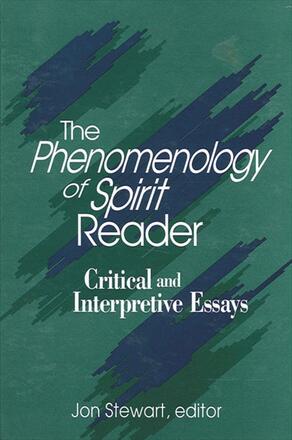
The Phenomenology of Spirit Reader
Critical and Interpretive Essays
Alternative formats available from:
The most complete collection of essays on Hegel's Phenomenology of Spirit available in any language, with essays by distinguished international Hegel scholars.
Description
The Phenomenology of Spirit was Hegel's first major philosophical work and is considered by many to be his masterpiece. Its several hundred pages treat topics as diverse as Greek drama, religion, medieval court culture, natural science, Romanticism, and the Enlightenment. Hegel regarded it as the introduction to his philosophical system as a whole, and it is often thought to be the most accessible work in his otherwise difficult philosophical corpus.
This anthology represents the most complete collection of essays on the Phenomenology in any language. It follows Hegel's table of contents, and all of the major sections of the work are covered. The main goal guiding the selection of essays was to collect the best articles written on the Phenomenology by distinguished international Hegel scholars and at the same time to provide systematic coverage. Although the essays are all by leading Hegel scholars, none of them presupposes any particular in-depth knowledge of Hegel or German philosophy. The object of the book is thus to make the Phenomenology more accessible for students while serving as an impetus for further Anglo-American Hegel research.
Among the contributors to the book are Howard Adelman, John W. Burbidge, Martin De Nys, Kenley R. Dove, Katharina Dulckeit, Joseph C. Flay, Moltke S. Gram, Daniel P. Jamros, George Armstrong Kelly, Alasdair MacIntyre, Mitchell H. Miller, Jr., Patricia Jagentowicz Mills, Karlheinz Nusser, David W. Price, John Sallis, Harald Schondorf, Gary Shapiro, Jean-Louis Vieillard-Baron, Kenneth R. Westphal, and Merold Westphal.
Jon Stewart is Associate Professor, Søren Kierkegaard Research Centre at Copenhagen University. He is editor of The Hegel Myths and Legends.
Reviews
"The editor's stated organizational principle of examining the Phenomenology in a systematic fashion sets a worthwhile goal for the volume. The Phenomenology is probably the most taught of Hegel's works and deserves this kind of treatment. The collection has much to recommend it, and I think it makes a worthwhile contribution." — William Maker, Clemson University